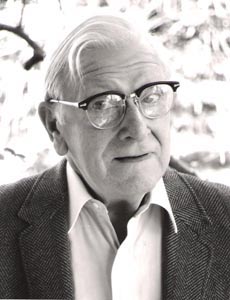 This Goodly Land
This Goodly Land
Eugene Walter (November 30, 1921–March 29, 1998)

Other Names Used
- Eugene Ferdinand Walter, Jr.: full name
- Dr. S. Willoughby: pen name
- Prof. James B. Willoughby: pen name
Alabama Connections
- Mobile, Mobile County: birthplace, childhood residence, adult residence
Selected Works
- Walter, Eugene. Monkey Poems. Paris: Editions Finisterre, 1953. Rpt. New York: Noonday Press, 1954.
- Walter, Eugene. The Untidy Pilgrim: A Novel. Philadelphia: Lippincott, 1954. Rpt. Tuscaloosa: University of Alabama Press, 1987. Rpt. Tuscaloosa: University of Alabama Press, 2001.
- Walter, Eugene. Love You Good, See You Later. New York: Scribner, 1964. Rpt. of Love You Good. Paris: Julliard, 1963.
- Walter, Eugene, and the Editors of Time-Life Books. American Cooking: Southern Style. New York: Time-Life Books, 1971.
- Walter, Eugene. The Likes of Which: Stories. Washington: Decatur House Press, 1980.
- Walter, Eugene. The Byzantine Riddle and Other Stories. London: Methuen, 1985.
- Walter, Eugene. Hints and Pinches: A Concise Compendium of Herbs, Spices, and Aromatics with Illustrative Recipes and Asides on Relishes, Chutneys, and Other Such Concerns. Atlanta: Longstreet Press, 1991.
- Walter, Eugene. Lizard Fever: Poems Lyric, Satiric, Sardonic, Elegiac. Livingston, Ala.: Livingston University Press, 1994.
- Walter, Eugene, and Katherine Clark. Milking the Moon: A Southerner's Story of Life on This Planet. New York: Crown Publishers, 2001.
Literary Awards
- Winner of Lippincott Fiction Prize Contest for Young Novelists, 1952, for The Untidy Pilgrim
- "I Love You Batty Sisters" included in Prize Stories 1957: The O. Henry Awards
Biographical Information
Eugene Walter was born and grew up in Mobile, Ala., where he was raised by his grandparents. After his grandparents' deaths, Walter was informally adopted by Hammond Gayfer, a local department store heir. While living with Gayfer, Walter became involved with the Children's Theatre Guild, acting in and designing and building sets for their productions. He also wrote his own marionette shows and performed them at prisons, hospitals, and timber camps. When Gayfer died, Walter joined the Civilian Conservation Corps to support himself. During World War II, he served in the US Army and spent three years as a cryptographer in Alaska. After the war, Walter moved to New York where he worked first at a rare book store and then at the New York Public Library. In his spare time, Walter did set designs for theater productions and took painting classes at the Museum of Modern Art. In 1951, Walter moved to Paris to study at the Alliance Française and the Sorbonne. He contributed articles, stories, and poems to a new literary magazine, the Paris Review, and worked on a novel he had begun in New York. In 1952, the uncompleted manuscript for The Untidy Pilgrim was awarded the $2500 prize in the Lippincott Fiction Prize Contest for Young Novelists. The completed book was published in 1954. A poetry collection, Monkey Poems, was privately published in Paris in 1953.
Walter received a Rockefeller-Sewanee Fellowship in 1956, the same year he moved to Rome to join the staff of the literary magazine Botteghe Oscure. In the early 1960s, Walter began working in the Italian film industry, translating scripts for directors such as Fellini, Wertmüller, and Zeffirelli and acting small parts. Walter's second novel, Love You Good, See You Later, was published in 1964. In the late 1960s, Walter wrote the text for American Cooking: Southern Style for the Time-Life Foods of the World series that described the cuisines of different cultures. Walter returned to Mobile in 1979, where he wrote articles about gardening, food, theater, and art for the Azalea City News & Review. Walter also published collections of short stories, poetry, and essays on Southern foodways and wrote articles for such magazines as Harper's, Vogue, Gourmet, and Food and Wine. In the 1990s, Walter collaborated with Katherine Clark on an oral history memoir, published in 2001. For the last five years of his life, he had a weekly ten-minute public radio program, Eugene At Large, on WHIL-FM. Walter died of liver cancer in Mobile in 1998.
Interests and Themes
Eugene Walter's stories feature quirky characters and chatty dialogue. Many have Alabama settings. His poems are baroque in style and are frequently illustrated with his own artwork. Walter’s cooking essays describe the role of food in Southern culture.
For More Information
Please check your local library for these materials. If items are not available locally, your librarian can help you borrow them through the InterLibrary Loan program. Your librarian can also help you find other information about this author.
There may be more information available through the databases in the Alabama Virtual Library. If you are an Alabama citizen, AVL can be used at your public library or school library media center. You can also get a username and password from your librarian to use AVL at home.
Reference Books
- Barrett, Rebecca, and Carolyn Haines, eds. Moments With Eugene: A Collection of Memories. Semmes, Ala.: Kalioka Press, 2000.
Reference Articles
- Wilson, Mindy. "Eugene Walter". Alabama Heritage 57. (2000): 6-19.
Reference Book Chapters and Encyclopedia Entries
- Caton, Bill. "Eugene Walter: Youthful Enthusiasm"; Fighting Words: Words on Writing from 21 of the Heart of Dixie's Best Contemporary Authors. Montgomery: Black Belt Press, . 192-199.
Location of Papers
- Auburn University
- University of South Alabama
- University of Texas at Austin
Photo by Jason Thompson; courtesy of the Caroline Marshall Draughon Center for the Arts & Humanities in the College of Liberal Arts, Auburn University.
Last updated on May 30, 2008.